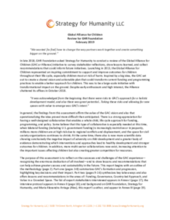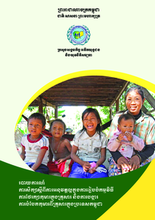This country page features an interactive, icon-based data dashboard providing a national-level overview of the status of children’s care and care reform efforts (a “Country Care Snapshot”), along with a list of resources and organizations in the country.
demographic_data
childrens_living_arrangement
children_living_without_bio
social_work_force
key_stakeholders
Key Stakeholders
Add New DataOther Relevant Reforms
Add New Datadrivers_of_institutionalisation
Drivers of Institutionaliziation
Add New Datakey_research_and_information
Key Data Sources
Add New DataMapping of residential care facilities in the capital and 24 provinces of the kingdom of Cambodia
National estimation of children in residential care institutions in Cambodia: A modelling study
Prevalence and number of children living in institutional care: global, regional, and country estimates
Shaping the national social protection strategy in Cambodia: Global influence and national ownership
Towards a Social Protection Strategy for the Poor and Vulnerable: Outcomes of the consultation process
Country Care Profile: Cambodia
Acknowledgements
Data for this country care snapshot was contributed by partners at Family Care First and UNICEF Cambodia.
Displaying 91 - 100 of 285
Presented at the UN Human Rights Council side event on Promoting Quality Alternative Care for Children with Disabilities on 5 March 2019, this video highlights the work of ABLE, a program of the Cambodian NGO Children in Families that provides inclusive family-based care for children with disabilities.
Sreyny Sorn, manager of the ABLE Project at Children in Families, gave a presentation at a side event at the United Nations Human Rights Council in Geneva on 5 March, 2019.
Hagar is seeking a new Finance Manager. This role is responsible for the oversight, management, and co-ordination of finance functions as defined, across Hagar globally.
"In June last year," says this article from BBC News, "33 pregnant women were arrested and confined to a villa in the Cambodian capital, Phnom Penh. All were surrogate mothers bearing children for foreign customers. They have since been released - but on the condition that they bring up the children themselves. The penalty is up to 20 years in jail."
This Life Cambodia is recruiting a Community Development Project Officer.
The purpose of this assessment is to reflect on the successes and challenges of the Global Alliance for Children (GAC) experience, a large-scale initiative to support and improve outcomes for children throughout their life cycle, especially children most at risk of harm.
As a member of the Senior Management Team (SMT) in Cambodia, the Director of Program Development and Quality (PDQ) is responsible for driving cross-functional engagement in the development and delivery of the Country Strategy Plan (CSP), developing annual plans and reporting on results.
The Head of Global Programmes will lead on expanding the reach, quality and impact of Hagar's programmes globally.
This short human rights in action article takes a critical approach to the translation of policy to practice and highlights risks involved with haste, outcomes measured in numbers and unrealistic timeframes, and rapidly transforming practice with nascent investment in a country’s capacity to assess and respond to the real needs of children and families within their communities.
This report (in Khmer) provides in-depth analysis of programs of 7 different NGOs in Cambodia working on the prevention of family separation and family preservation in order to respond to risks related to physical and mental well-being and domestic violence.


